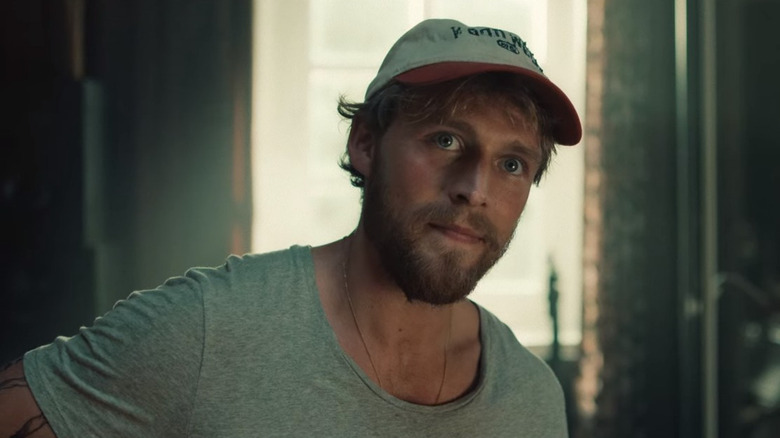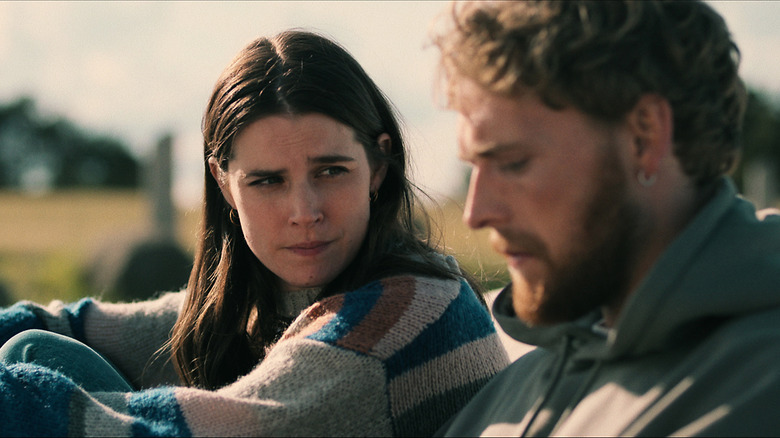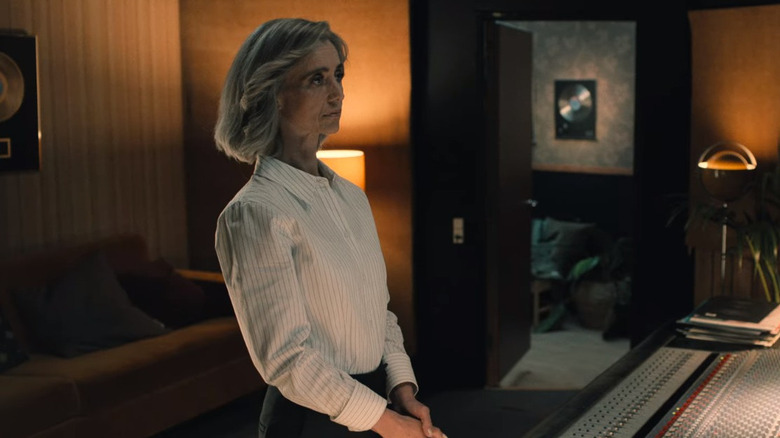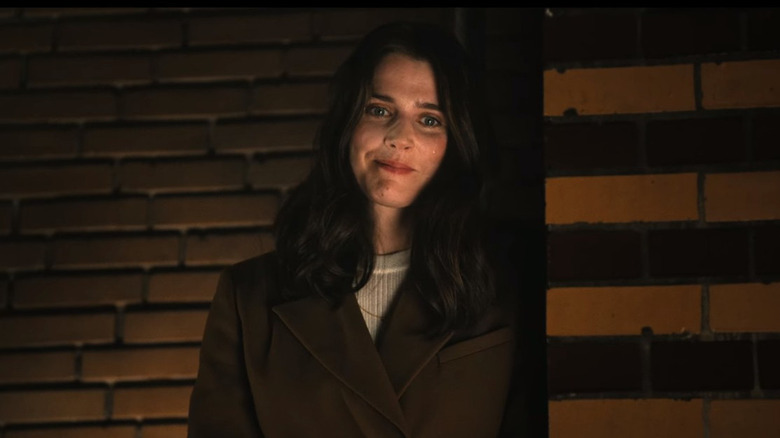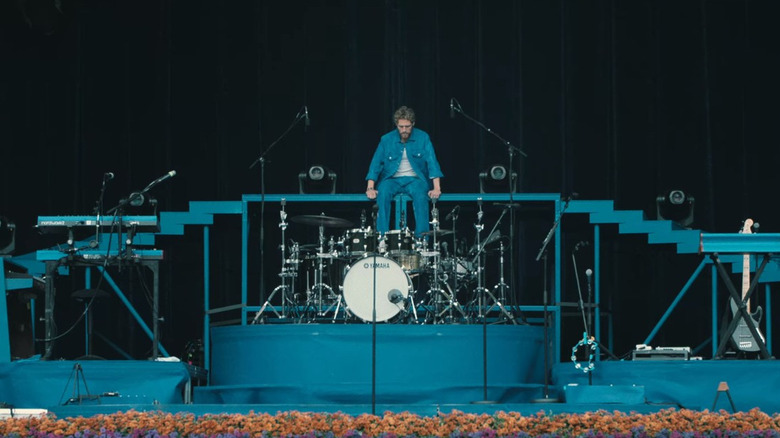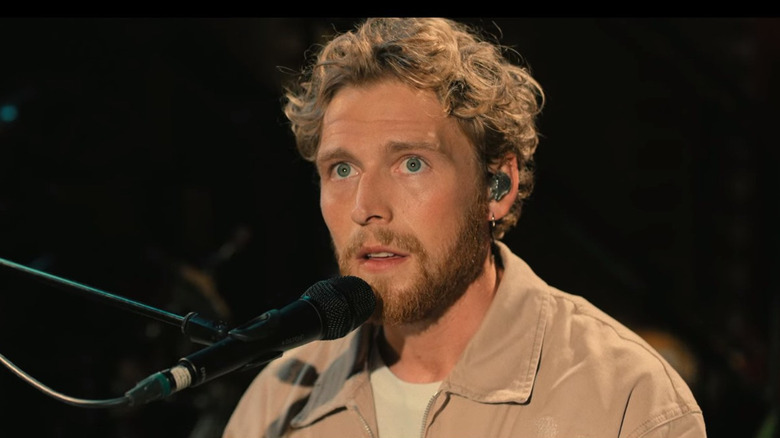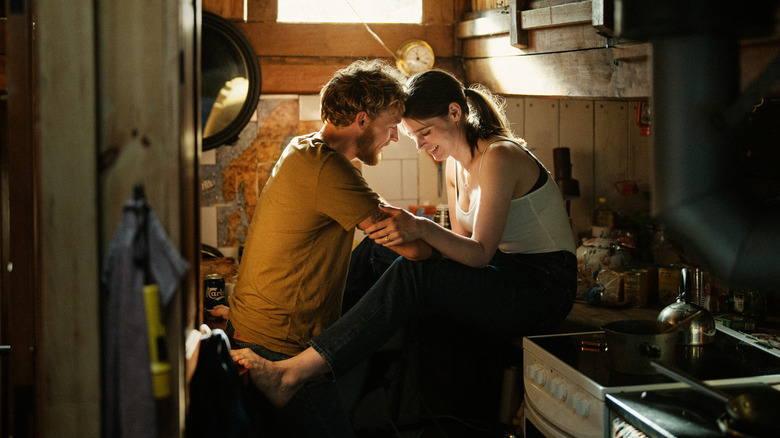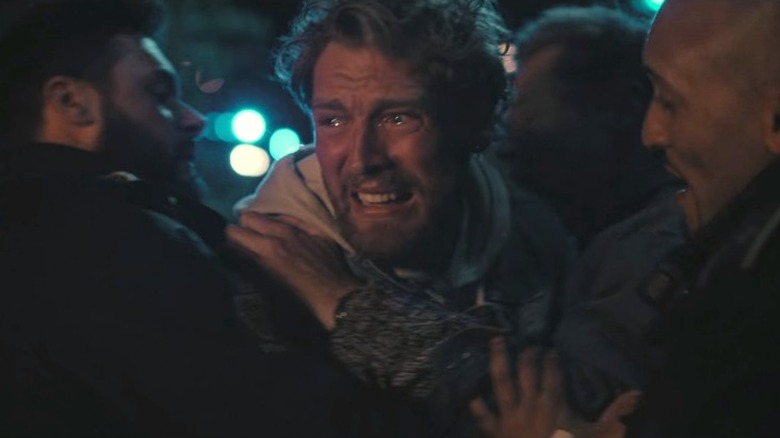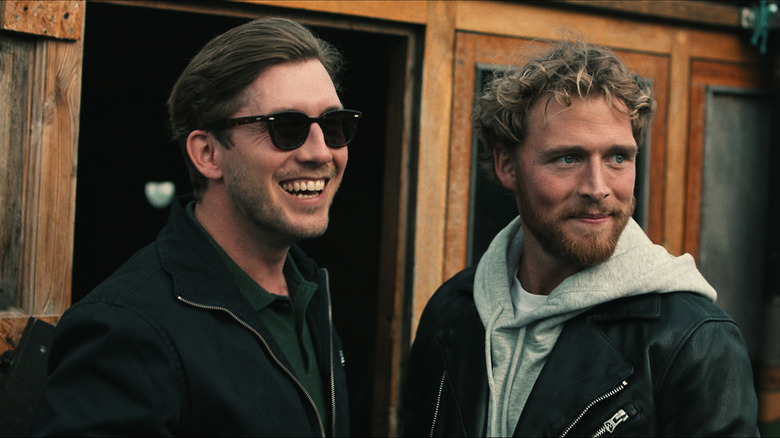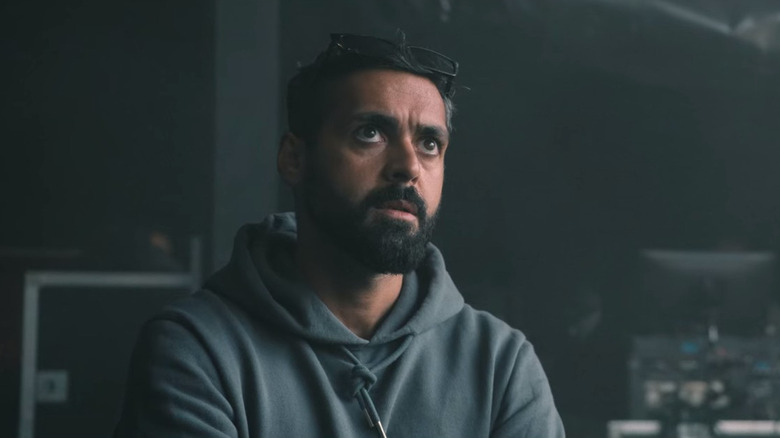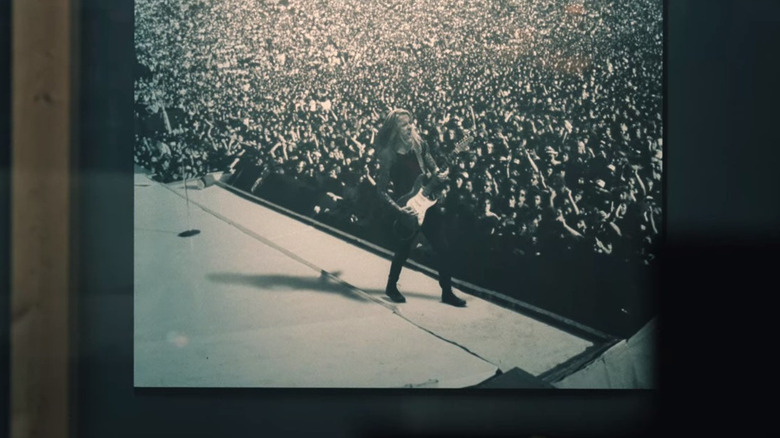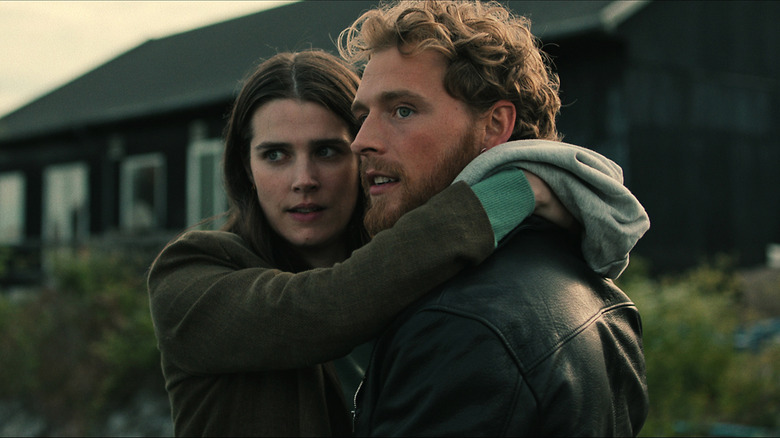The Ending Of A Beautiful Life Explained
"A Beautiful Life" dropped on Netflix in June 2023. It's one in a long list of music movies delivered by the streamer following the likes of "Purple Hearts" and "Eurovision Song Contest: The Story of Fire Saga." However, unlike most entries in this genre, the protagonist is not actively seeking fame and success from the start, or even a career in music like Cassie, or Lars and Sigrit. This drama, which is set in Denmark, follows a musically gifted young man called Elliott, who's content to work as a fisherman and write songs that other people sing. That all changes when he's discovered by Suzanne, a well-known manager, at a party. Suzanne introduces Elliott to her divorced daughter and music producer, Lilly, and Elliott catches feelings for her. Both these feelings and his rough past complicate his big break.
In the starring role of Elliott is Christopher, an emerging music star in real life. He's joined by "The Last King" star Inga Ibsdotter Lilleaas as Lilly, Christine Albeck Børge as Suzanne, Ardalan Esmaili as music producer Patrick, and Sebastian Jessen as Ollie, Elliott's best friend and collaborator. The film focuses on this small group of characters, who are each navigating major changes in their lives. While the concept of the film is simple, some moments are a bit confusing or subtle, including what actually happens between Elliott and Lilly at the end. For those wanting the full breakdown, this is the end of "A Beautiful Life" explained.
What you need to remember about the plot of A Beautiful Life
To really understand the ending of "A Beautiful Life" and appreciate how far the characters go in the span of a few weeks, it's important to look at where they began. When we first meet Elliott, he's settled into a life of solitude, first as he separates himself from the other fishermen, and then as we get a glimpse into his life alone on his boat. There are only two people able to penetrate Elliott's bubble: his boss Jesper (Paw Henriksen) and his best friend Ollie. Although Ollie turns out to be a pretty terrible friend to Elliott, he does set the wheels of his new career in motion when he unintentionally gives him a shot to sing in front of Suzanne, a big-time music manager and the former wife of the late music legend Vince Taylor (no connection to the real-life musician of the same name).
After a not-so-gentle nudge (aka firing) from his boss, Elliott agrees to work on some music. Enter Suzanne's daughter Lilly. Her advice brings the fisherman out of his shell and makes the audience feel invested in the characters. A song is a relationship between two people, the one who sings and the one who listens, she tells him. Without that, a song can't exist. These words become an important touchstone for the movie and each song that Elliott sings, especially as he navigates the twists and turns of his relationship with Lilly.
Why does Suzanne want Lilly to work with Elliott?
After Elliott's late-night brawl, Suzanne gets him out of jail and asks that he "hang out" for a week as a thank you. It's obvious to viewers that she means to have him come round to discuss and work on music. But to Elliott, whom she's also paying 10,000 Danish Krone, it's apparently a bit of a surprise. Right off the bat, he makes it clear he doesn't have the desire to become a famous musician. Likewise, Lilly is just as disinterested, believing Elliott doesn't have the commitment it takes to make great music. So the question is, why did Suzanne push so hard for them to work together?
There were subtle looks on Lilly's face as she reacted to seeing Elliott at the bar, and from this she knew her daughter could be enticed into working with him. Suzanne selfishly wanted to get Lilly to stick close to home and not go back to London, with the hope that their proximity might begin to mend the rift between herself and her daughter. Though never stated, it also seems that Suzanne saw something of her late husband in the young musician, even using Vince's dormant Instagram account as a platform to launch Elliott's music from. Of course, it facilitates the story, too, paving the way for Elliott and Lilly to spend time together and ultimately fall in love, though Suzanne might not have predicted that.
What happens at the end of the movie?
"A Beautiful Life" reaches its climax close to the end of the movie. For weeks, Elliott, Lilly, Suzanne, and Patrick have been working tirelessly to bring the fisherman's music to the world. With constant interruptions from Ollie, who thinks he deserves a piece of the pie, Elliott's relationships with each of them become strained. Even after Suzanne sends Ollie packing, things don't return to normal.
Knowing that his friendship with Ollie is all but destroyed starts to tip Elliott over the edge as he's unable to cope with the loss of the only constant in his life since his parents died. Then Lilly shocks him with the news that she is pregnant. Elliott has a choice to make and, feeling overwhelmed, it seems like he is going to choose his career over Lilly and the baby. He leaves her, only to be hit with another devastating blow: his boat has been destroyed in a fire.
Cut to Elliott's first live performance and Lilly's not there. As a result, Elliott gets emotional and breaks down midway through his debut song, "Hope This Song Is For You," which he wrote for Lilly. As the audience sings his own words back to him at a time when he can't, it's clear Elliott's thinking about her. This sets him on the path of writing the film's final song, which brings the movie to a close.
Why is Elliott in London?
After his first concert, inspiration strikes and we see a montage of clips showing Elliott writing all night. But before viewers are given any more information, it's morning and a hungover Elliott is awoken by Patrick as his tour bus pulls up outside a TV studio in London. At this point, it's not too much of a stretch to think Elliott has raced across the continent to find Lilly, but his demeanor on the bus makes it clear he doesn't want to be there. The movie then cuts to a scene of Lilly talking with Suzanne where there is no mention of Elliott.
At this point, viewers don't know Elliott's written a new song that he plans to sing to Lilly, or if he's even going to get the chance to make things right with her, and for a moment it's quite ambiguous why he's in London. When the movie cuts back to Elliott, we see him inside a studio for a TV talk show, which seems a bit odd. However, an easily missed conversation between Suzanne and Patrick earlier in the film explains that this is one of the stops on the promotional campaign they've organized for him.
And, unsurprisingly, this ends up being the perfect final location for the film, as Lilly just happens to show up just as Elliott is about to sing his chart-topping hit "Hope This Song Is For You." However, when he sees her he switches things up at the last minute and we get to hear the song he spent all night writing.
Elliott's last song illustrates what the future holds for him and Lilly
The last few minutes of "A Beautiful Life" are arguably the film's most confusing, as what happens at the end of the movie is not clarified. Instead, it uses Elliott's song, which is actually called "A Beautiful Life," to illustrate what could happen, and allows viewers to use their imaginations to fill in the gaps. All the while, Elliott is singing straight to Lilly.
His song begins by acknowledging his reaction to the pregnancy, explaining all the reasons he was afraid to try. It serves as an apology to Lilly, as it goes on to paint a picture of what their life together could look like with a baby. In it, he imagines them raising a daughter together. Several lines repeat in the chorus, but one word noticeably changes. At the beginning we hear Elliott sing: "And I'm gonna miss the times when / It was just the two of us." And later the word "two" is replaced with "three" to illustrate his happiness with their growing family. When it's over, Lilly smiles through her tears, while Elliott subtly nods, signaling that they are reuniting and choosing to have this life together with their baby.
Elliott and Lilly's pasts were holding them back
While it's a cliche romantic trope for screen couples to say that their life began when they met each other, Elliott and Lilly do fall into this category. They both have childhood trauma they haven't dealt with, but they start to address it when they get together. It's not explicit and we don't see them overcome with emotion in a therapy session, but they start to work through things in subtle ways, and by unburdening themselves, they mark a new chapter in their lives where they're able to create great music together.
In the past, Elliott spent a lot of time saying he has no interest in a music career. He tells himself he's only working with Suzanne and Lilly for the money. Eventually, this changes. Elliott realizes that he's really just been too scared to try and fail before. When he acknowledges that has people in his life on whom he can fall back, and someone to sing to, it becomes a far easier chance for him to take. As a result, he starts to shed the weight he's been carrying and lets his creativity loose.
For years, Lilly also carried with her a complex relationship to music. While it's a huge part of her life and a connection to her dad, it's also the thing that constantly kept him away from her as a child. As the movie progresses, the weight of this slowly lessens and we see her find true joy in her work as a producer independent of her father.
Elliott confronts his anger
After seeing Elliott get in a fight at the start of the movie and being arrested, viewers learn that this is pretty characteristic of the fisherman. It's perhaps not surprising that he feels the need to swoop in and be the one to defend someone in a fight, as he could do the same for his parents. The anger, grief, and loss seem overwhelming at times, especially after he loses his boat and his last link to them. His screaming "They're in there," as he watches his boat go up in flames, shows just how tightly he's been holding onto the picture and piano, the last remaining possessions of theirs he had.
The loss of the boat, which he planned to fix up and sail around the world in their honor, marks the climax of the film. Now also estranged from Lilly, it seems like Elliott is going to let his fury overwhelm him, especially when he angrily screams into the mirror in his dressing room. Instead, he confronts his emotions and channels that energy into something positive. The result is "A Beautiful Life," his song for Lilly, and his commitment to becoming a good partner and father. Though devastated by the loss of his boat, his last remaining link to his parents, he doesn't become crippled by it, and Elliot learns that as long as he has a home with Lilly, Suzanne, and Patrick, he still has family around.
What happened to Ollie?
Sebastian Jessen's character Oliver, or "Ollie," is Elliott's longtime best friend. Although it's obvious from the get-go that their friendship is one-sided, Elliott refuses to let anything happen to Ollie and lets his friend take advantage. Beyond showing that Elliott deserves, and ultimately gets, better people in his life, Ollie's arc serves as a moral commentary on jealousy and greed and how it can get the best of you.
Oliver, though cared for by his wealthy father, should have wanted for nothing. Instead, he wanted everything his friend had. His jealousy cost Elliott his family memories because, in case you didn't already guess, he's the one to burn Elliott's boat. Ollie briefly appeared in the crowd wearing a black hoodie and a menacing facial expression that said, "This is what you deserve." He locked eyes with Elliott for a moment before disappearing into the night.
Ollie does get what he deserves. Having quite literally burnt his final bridge with Elliott, been forcefully kicked off the album by Suzanne, and financially cut off by his father, Ollie is left alone in debt, with nothing but his jealousy to keep him company. Although a redemption arc wouldn't be out of the question if we ever saw him again, Ollie got a fitting end in his movie, with his story highlighting the central themes of family and loyalty being the most important thing.
Patrick found his family through music
Family and love of music are two prominent themes in "A Beautiful Life." Although the movie primarily focuses on Elliott and Lilly, Suzanne and Patrick are also integral supporting characters. For most of the movie, Patrick doesn't get an arc beyond supporting that central trio's careers, but in a pivotal moment where Elliott loses all hope, Patrick shares a part of his past with Elliott.
Although he was skeptical about Elliott at the beginning, in this moment he supports him in a way Ollie never did, and proves himself a true friend to the rising star musician. Patrick explains that he has the same affinity for music as Elliott, but not the same level of talent. Nevertheless, music still saved him. Orphaned at a young age like Elliott, Patrick was all alone until he found Suzanne, Lilly, and Vince. He infers that Suzanne, especially, found him at a time in his life when he really needed her—and a family—and they bonded through their love of music. As a result of this conversation, Patrick becomes a symbol of hope for Elliott, showing what he can have if he just admits to himself that he wants it.
What exactly happened to Vince Taylor?
One of the biggest mysteries in "A Beautiful Life" is the death of Lilly's dad and Suzanne's husband Vince Taylor. A globally celebrated musician, Vince toured all over the world before he died a few years before the events of the film. His death was clearly a sticking point between Lilly and Suzanne, who had a very strained relationship after a long separation at the beginning of the movie.
As the movie progresses, small details about his death are revealed. At the dinner table, Lilly reveals that he committed suicide by jumping off the balcony of his hotel room. She tries to talk to her mom about it, explaining that she knew Suzanne had been receiving calls from his hotel room the night he died, but that they went unanswered. Before she can explain how she has this information, they're interrupted, and a lot is left unsaid until the end of the film, when Suzanne seeks out her daughter in London to have the conversation that she's been putting off. Suzanne admits Vince's multiple affairs were the reason she didn't answer the phone, but Lilly reveals it was actually her calling after finding out her father was dead.
This conversation becomes a big turning point in their relationship. Lilly has always held her mom at arm's length, as she blamed her for not being there for her. Now, as an adult, she can empathize and understand why she didn't answer the phone. As there are no longer any secrets keeping them apart, they can move forward and heal their relationship.
The ending is a callback to a conversation at the start of the movie
The ending of "A Beautiful Life" is just that: beautiful. The film leaves viewers with an important message—that family and love are the most important things in this world—and celebrates it through music. Fame and success mean nothing if you can't share it with the people you care about. Happily, Elliott comes to realize this before it's too late. And, thanks to a conversation at the beginning of the film, we know that Elliott and Lilly are going to find the balance between family and music going forward, something Suzanne and Vince never did.
When first in the recording studio with Elliott, Suzanne emphasized that the fisherman should give his all to music, but Lilly shut her down, explaining that you don't have to choose love or music; it is possible to have both. In his song "A Beautiful Life," Elliott proves to Lilly that he understands and believes this. There's a line that says "'Daddy, I can't sleep', she said/Can you leave the light on?/And please sing me my song." It's a reference to Lilly saying her dad never sang to her, let alone wrote her own song, but also a demonstration of Elliott's commitment to doing things differently with Lilly and not repeating the same pattern.
